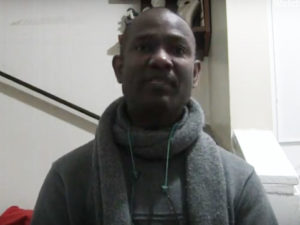Spirited Reflection: Why migration?

January 6 is the beginning of Epiphany and KAIROS reflections are focusing on the issues surrounding migration and migrant workers, based on the Epiphany Resource Light of a Star (digital) (print).
Gabriel’s Story
Gabriel lost his job because of a combination of unjust global financing and a natural disaster. After a hurricane, he came to Canada as an agricultural worker in order to support his family:
In my home country, unemployment is high. The situation is really worse now because of the global financial crisis and also as a result of the WTO ruling, where our bananas no longer enjoy preference in England. Lots of farmers were driven off their land and then a hurricane destroyed most of the banana fields. I used to buy from those farmers. Because of these main reasons, I became unemployed. And at that time that was the lowest point in my life because I had a family to support. -Gabriel
Why do people leave home?
The KAIROS Migrant Justice Program is deeply rooted in our Christian belief that all people are created in the image of God and are equal in dignity and rights. The biblical call to welcome the stranger invites us to go beyond our mistrust and suspicion in order to welcome newcomers into our community. In Leviticus, we read: “The alien who resides with you shall be to you as the citizen among you” (Lev 19: 34). When we recognize the stranger as fellow citizen, then their well-being is no longer seen as a matter of charity, but as a matter of rights and entitlement.
Migration has been happening since time immemorial and the factors that have shaped migration patterns still have an impact today, whether they are ‘push factors’ or ‘pull factors.’
Push factors are those that cause people to leave their country, such as war, climate change and natural disasters or the lack of jobs. Pull factors are those that cause someone to travel to another country, such as opportunities for jobs, education or a better standard of living. Both push and pull factors are often the result of unfair trade, labour or financial practices among countries.
People continue to migrate in large numbers today because it provides benefits to both sending countries and host countries. For example, remittances, or the money that migrant workers send to their home countries, are vital not only to their families but to the home countries’ economies.
As we know, people come to Canada for many different reasons. Temporary foreign workers represent one of the major groups. These people are recruited to come to Canada on a temporary status to fill in jobs when Canadian workers cannot be found. Currently, KAIROS’ work focuses on Temporary foreign workers, particularly on those working in the areas of caregiving, agriculture (like Gabriel) and food processing. KAIROS’ concerns surround the barriers and challenges these workers face in protecting their status and health, rights and access to support services once in Canada. The Epiphany Resource for Justice Seekers helps explore these challenges and how we can take action to bring justice to our workers.
Prayer:
God of light and deliverance, we pray for those who have come to Canada seeking a better life for themselves and their families. Open our hearts and hands to share the prosperity and abundance of this land.
We pray for those who have come to Canada after being forced from their homes due to poverty, war, climate change, and other threats. May your peace abound where there is strife, fear, and uncertainty, both in our hearts and in our lands.
You defend the needy and rescue the poor. Give us courage to defend the inherent dignity and fight for the inherent rights of all people.
Help us to honour the gifts migrants and refugees bring with them as we build a common future.
You can also learn about the factors that cause migration to Canada by watching the KAIROS video, Borderless
This reflection was a compilation from the some of the Epiphany team of writers: Gabriel (Migrant agricultural worker), Rev. Dr. Sarah Travis, Rev. Laura Sauder, Carolyn Pogue, Connie Sorio, Elena Tkacheva, Anna Jacobs, and Shannon Neufeldt.







